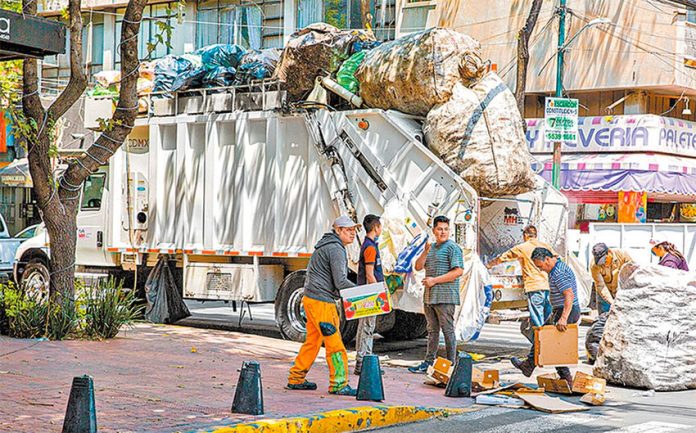The federal government has ordered non-essential workers to stay at home but among those who will continue to work through the Covid-19 pandemic are the nation’s invaluable garbage collectors.
“With coronavirus, earthquakes, whatever it is, we can’t stop,” Javier, a garbage collector in the Mexico City borough of Miguel Hidalgo, told the newspaper Milenio, adding that he and his colleagues will continue to work “with a smile.”
He and the other members of his trash collecting team meet in the early hours of every morning at the Bordo Poniente dump in Mexico City before heading to Miguel Hidalgo to complete their rounds through eight different neighborhoods.
Despite the growing outbreak of Covid-19 in Mexico, Javier said that the collectors haven’t been given face masks or antibacterial gel to help protect them infection.
“There are no masks or gel nor a boss who will give us the day off because of coronavirus, there’s not even water,” he said.
The possibility of wearing a mask and even gloves while on the job “depends on whether we have money or not to buy them,” Javier said, although he added that people sometimes gift the items to them.
“My gloves are the ones I’ve always used … now I try to wash them every day,” he said.
Édgar, the youngest member of the crew, said that the garbage collectors are aware of the risks of their job but like millions of other Mexicans have to continue working in order to be able to support themselves.
“We’re always exposed [to health risks] and with the virus even more; people put everything in the trash – toilet paper, tissues they use to blow their nose, the things that they eat, the things they don’t eat, everything. Everything is a focus of infection for us but what can we do? I live from this and if I don’t work I don’t eat,” he said.
Nadia, a 25-year-old mother and garbage collector for the past two years, said that her partner also works in trash collection and that one of them takes care of their 9-month-old baby while the other is at work.
“He’s on another route in the afternoon … so he looks after Brandon in the morning and I arrive [home] when he leaves,” she said.
The driver of the Miguel Hidalgo team’s truck, Gilbrán, told Milenio that even though he has less contact with the trash they collect, he faces the same health risks.
“But my daughters are worth it; the truth is that you get very tired [but] you get used to the smell. … It’s a decent job, my daughters go to school because of it,” he said.
Gilbrán added that because more people staying at home amid the outbreak of coronavirus outbreak, there is more rubbish to collect. However, one positive is that the collectors have noticed that their tips have increased slightly over the last week.
The extra money will come in handy should any member of the crew fall ill. After explaining that his five co-workers are like his second family, Javier said:
“If one of us gets sick, we all have to put in part of our tips [to buy medicine] so that they get better quickly. It’s an agreement, a deal between us. Who else will pay for the medicine for he [or she] that gets sick from coronavirus?”
Source: Milenio (sp)
